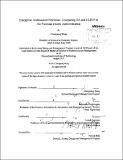| dc.contributor.advisor | Deborah J. Nightingale. | en_US |
| dc.contributor.author | Wang, Chunguang, S.M. Massachusetts Institute of Technology | en_US |
| dc.contributor.other | System Design and Management Program. | en_US |
| dc.date.accessioned | 2013-01-23T19:47:01Z | |
| dc.date.available | 2013-01-23T19:47:01Z | |
| dc.date.copyright | 2012 | en_US |
| dc.date.issued | 2012 | en_US |
| dc.identifier.uri | http://hdl.handle.net/1721.1/76512 | |
| dc.description | Thesis (S.M. in Engineering and Management)--Massachusetts Institute of Technology, Engineering Systems Division, System Design and Management Program, 2012. | en_US |
| dc.description | Cataloged from PDF version of thesis. | en_US |
| dc.description | Includes bibliographical references (p. 92-94). | en_US |
| dc.description.abstract | There are numerous frameworks for abstracting an enterprise complex system into a model for purposes of analysis and design. Examples of such frameworks include the Complex Large-scale Interconnected Open Social-technical System (CLIOS) process for handling enterprise system architecture, the Enterprise Architecture eight views (EA) for diagnosing and improving overall enterprise performance, and the Enterprise Strategic Analysis for Transformation (ESAT). In addition to helping identify and manage complexity, emergent behavior and the requirements of many stakeholders, all of these frameworks help identify enterprise-wide processes, bringing value-added flow between enterprises and their stakeholders. This thesis evaluates the applicability of integrating these frameworks into a hybrid process in ongoing programs and to determine if a standard process can be generated through an integrative, interdisciplinary approach using the above models and frameworks. Enterprise Architecture eight views framework as developed at MIT is designed to create enterprise-level transformations in large, complex socio-technical enterprises. In the past 15 years of research at LAI, these enterprise developments have been applied and validated in the government and in other industries including aerospace, transportation, healthcare case, defense acquisition and logistics. The CLIOS process, also developed at MIT, is designed to work with Complex, Largescale, Integrated, Open, Socio-technical systems, creating strategies for stakeholders to reach goals through enterprise development. This process has been used heavily in transportation systems, energy distribution, and regional strategic transportation planning. This thesis will apply both of these frameworks to the case of Veterans Affairs health care enterprise to evaluate its effectiveness. Based on insights from self-assessments and the organization's strategy, a transformation plan will be generated for the Veterans Affairs organization's current state and preferred future state. These outcomes will help to identify the strengths of the merged methodology. | en_US |
| dc.description.statementofresponsibility | by Chunguang Wang. | en_US |
| dc.format.extent | 94 p. | en_US |
| dc.language.iso | eng | en_US |
| dc.publisher | Massachusetts Institute of Technology | en_US |
| dc.rights | M.I.T. theses are protected by
copyright. They may be viewed from this source for any purpose, but
reproduction or distribution in any format is prohibited without written
permission. See provided URL for inquiries about permission. | en_US |
| dc.rights.uri | http://dspace.mit.edu/handle/1721.1/7582 | en_US |
| dc.subject | Engineering Systems Division. | en_US |
| dc.subject | System Design and Management Program. | en_US |
| dc.title | Enterprise architecture processes : comparing EA and CLIOS in the Veterans Health Administration | en_US |
| dc.title.alternative | Enterprise architecture processes : comparing Enterprise Architecture and Complex Large-scale Interconnected Open Social-technical System in the Veterans Health Administration | en_US |
| dc.type | Thesis | en_US |
| dc.description.degree | S.M.in Engineering and Management | en_US |
| dc.contributor.department | System Design and Management Program. | en_US |
| dc.contributor.department | Massachusetts Institute of Technology. Engineering Systems Division | |
| dc.identifier.oclc | 823646858 | en_US |
